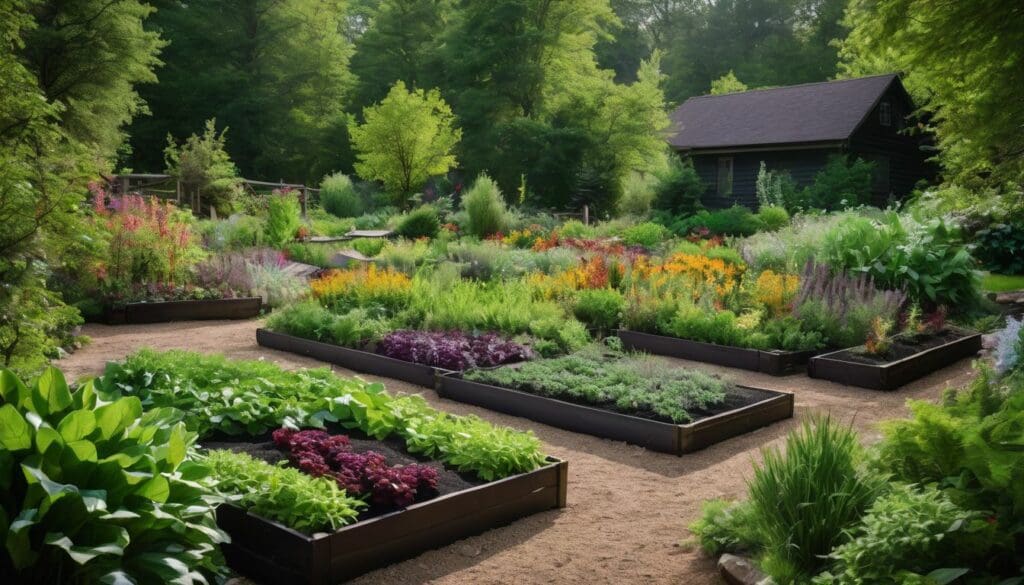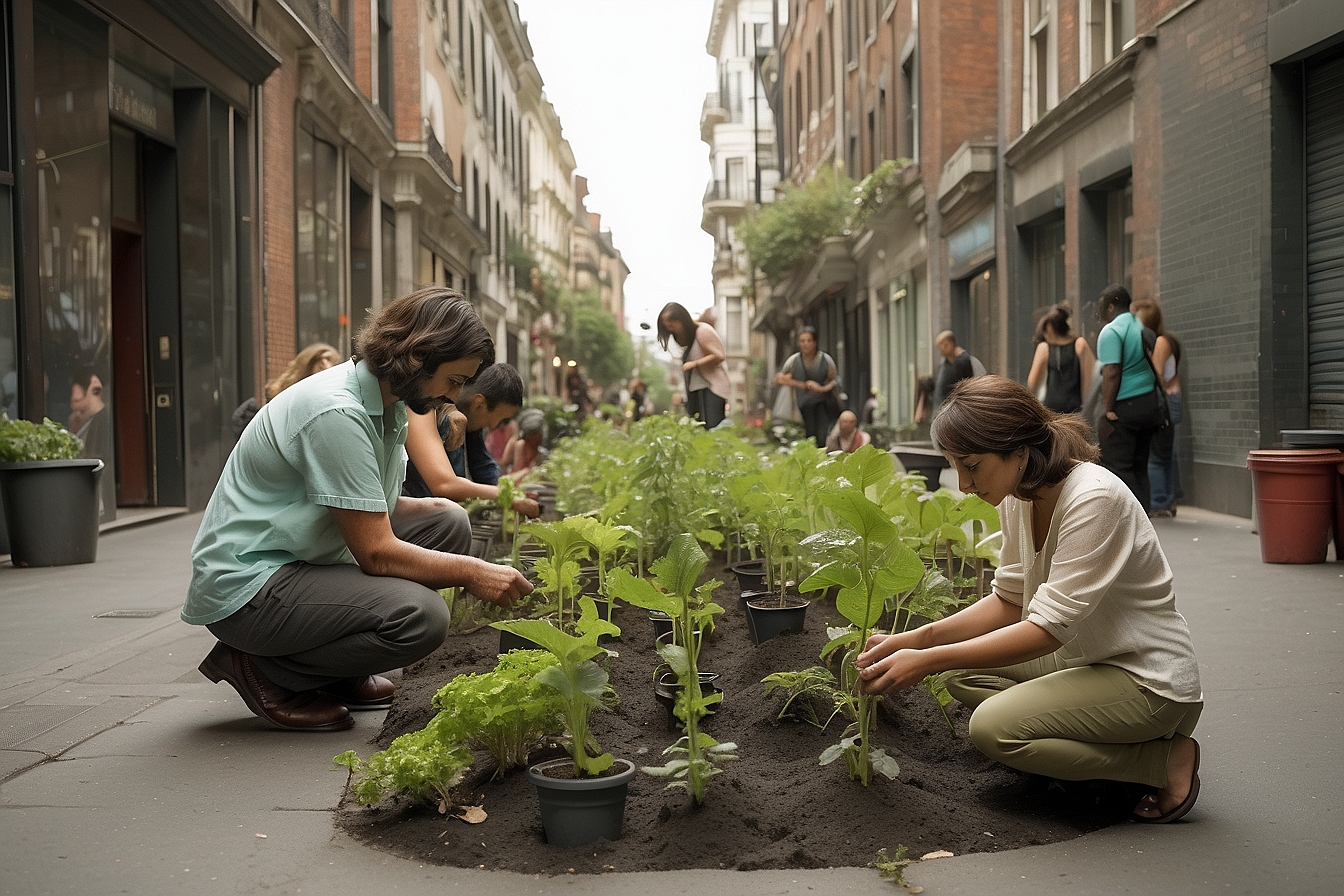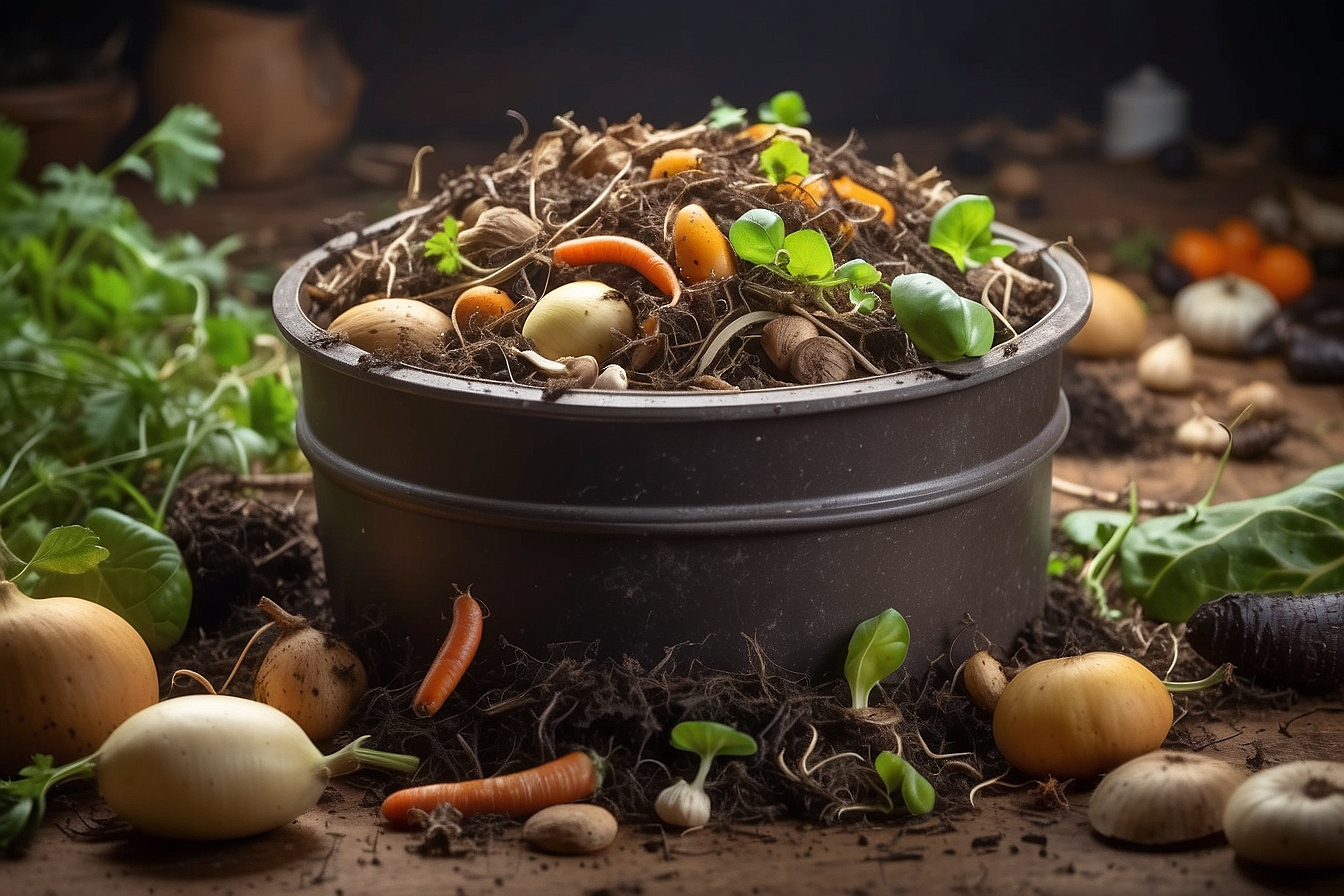Struggling to nourish your garden without turning to harsh chemicals? You’re certainly not alone; we completely understand the dilemma, and it seems that an overwhelming majority of gardening enthusiasts – over 60%, in fact – are seeking out natural alternatives.
That’s precisely why we’ve thoroughly researched the world of homemade organic fertilisers – there truly are effective, environmentally-friendly options right at your fingertips! Carry on reading for insightful tips that will naturally invigorate your garden – let’s cultivate a greener patch together!
Key Takeaways
- Making your own organic fertilisers can significantly reduce gardening costs and environmental impact by repurposing kitchen scraps like coffee grounds, eggshells, and vegetable water.
- Homemade natural fertilisers provide essential nutrients such as nitrogen, potassium, and phosphorus without the use of synthetic chemicals, ensuring a safer environment for both plants and wildlife.
- Joining local gardening clubs or communities offers valuable opportunities to learn about eco-friendly practices and share homemade fertiliser recipes for sustainable gardening.
- Regularly monitoring plant health helps determine the appropriate timing for applying DIY fertilisers during the growing season or whenever plants show signs of nutrient deficiency.
- Properly sourcing ingredients from untreated organic waste guarantees that homemade garden amendments are truly environmentally friendly, supporting a healthier ecosystem within your garden space.
Benefits of Homemade Organic Fertilisers
Homemade organic fertilisers are free of chemicals, environmentally-friendly, and cost-effective. They provide the necessary nutrients for plants while also promoting a healthy and sustainable environment.
Free of chemicals
We understand your concerns about keeping your garden healthy and safe. That’s why we advocate for the use of homemade organic fertilisers, as they ensure that what you put into your soil is entirely free of synthetic chemicals.
By choosing DIY fertiliser recipes, you directly control the content and quality of the nutrients feeding your plants.
Our gardens deserve purity from root to stem, which can only be guaranteed by steering clear of harsh commercial additives. When we prepare our own organic compost or natural plant food, we preserve not just the integrity of our vegetables but also safeguard the environment from unwanted chemical run-off.
Embracing homemade organic soil amendments is a step towards sustainable gardening while nurturing eco-friendly practices in our homes and communities.
Environmentally-friendly
Moving from the use of organic fertilisers being free of chemicals to their environmentally-friendly nature, it’s crucial to acknowledge the positive impact these homemade solutions have on our surroundings.
By utilising kitchen scraps and organic waste for homemade organic fertilisers, we reduce the amount of biodegradable waste that ends up in landfills. This approach not only lessens the production of harmful greenhouse gases but also contributes to healthier soil and helps conserve natural resources.
Through the eco-friendly practice of creating and using homemade organic fertilisers, we actively participate in sustainable gardening while promoting a greener environment for future generations.
The environmentally-conscious individuals amongst us are aware that making conscientious choices about our gardening practices can lead to significant positive environmental outcomes.
Cost-effective
Creating homemade organic fertilisers is an incredibly cost-effective way to nourish your garden without breaking the bank. By utilising kitchen scraps and other natural ingredients, you can produce nutrient-rich fertilisers at minimal or no expense.
This not only helps in reducing waste but also saves money on purchasing commercial fertilisers, aligning with our commitment to environmentally friendly practices.
In addition to being environmentally conscious, making your own organic fertilisers is a budget-friendly option for enriching your soil and providing essential nutrients for healthy plant growth.
Homemade Organic Fertiliser Recipes
Discover easy and effective homemade organic fertiliser recipes using kitchen scraps like rice, pasta, potato water, eggshells, vegetable water, coffee grounds, banana peels, fish tank water, wood ash, compost tea, liquid seaweed, comfrey tea and worm or animal manure tea.
These natural alternatives are not only eco-friendly but also cost-effective for your garden.
Rice, pasta, and potato water
Rice, pasta, and potato water provide a nutrient-rich liquid that can be used as a homemade organic fertiliser for your garden. These starchy water leftovers are packed with valuable nutrients such as potassium and carbohydrates, which help stimulate plant growth and overall health.
By recycling this kitchen waste into an organic fertiliser, you contribute to reducing food waste while providing beneficial nutrients to your plants.
As environmentally conscious individuals, we can utilise this simple yet effective method to create our own natural plant fertilisers without relying on chemical-based alternatives.
Eggshell water
Crushed eggshells infused in water create a nutrient-rich liquid fertiliser that provides calcium to plants, helping prevent blossom end rot in tomatoes and other fruiting vegetables.
To make eggshell water, simply collect and wash eggshells from your kitchen use. Once clean and dry, crush the shells into small pieces, then steep them in water for a few days until the solution turns slightly cloudy.
This homemade organic fertiliser can be used to water your garden or potted plants once or twice a month during the growing season, offering natural nourishment for healthy plant growth.
When using eggshell water as a fertiliser, it’s essential to sieve out any solid particles before application to avoid clogging irrigation systems or causing an uneven distribution of nutrients on your plants.
Vegetable water
Vegetable water is a rich source of nutrients for your garden. After boiling or steaming vegetables, allow the water to cool before using it on your plants. This water contains essential vitamins and minerals that can enrich the soil, providing much-needed nutrition for your plants to thrive and grow strong.
Using vegetable water as a homemade organic fertiliser not only reduces waste but also promotes sustainability in gardening practices. By harnessing the nutrients already present in these leftover liquids, you can help support a healthier and more productive garden without resorting to chemical-based alternatives.
With this simple yet effective method, you can make the most of every resource at your disposal while nurturing a flourishing green space at home.
Coffee grounds
Coffee grounds are a great addition to homemade organic fertilisers for your garden. They add nitrogen, potassium, and phosphorus to the soil, promoting healthy plant growth. Coffee grounds also help improve drainage in clay soils and increase water retention in sandy soils.
When using coffee grounds as a fertiliser, it’s essential to mix them with other organic materials like compost or manure to balance the nutrient levels.
To make use of your used coffee grounds, simply sprinkle them around the base of your plants or work them into the soil. You can also create a liquid fertiliser by steeping coffee grounds in water and then using the strained liquid to feed your plants.
By incorporating this natural ingredient into your homemade fertiliser recipes, you’re contributing to sustainable gardening practices while enriching your garden soil.
Banana peels
After using coffee grounds as a homemade organic fertiliser, turning to banana peels is another sustainable and eco-friendly choice. Banana peels are nutrient-rich and make an excellent addition to your compost or liquid fertiliser mix.
Simply chop up the peels and add them to your compost heap for a boost of potassium, phosphorus, and calcium. Alternatively, soak the peels in water for a few days and use the resulting liquid as a natural plant fertiliser.
Moreover, banana peel tea can be sprayed directly onto plants to give them an extra nutritional kick. This waste-to-wealth approach not only nourishes your garden but also reduces landfill waste.
Fish tank water
Using fish tank water as a homemade organic fertiliser for your garden is an excellent way to provide essential nutrients to your plants. When you clean out your fish tank, save the nutrient-rich water instead of disposing of it.
This water contains beneficial nitrogen and other minerals that can nourish your plants, promoting healthy growth and vibrant blooms without using chemical fertilisers.
Introducing fish tank water into your gardening routine not only provides natural plant food but also helps in reducing waste. By repurposing this resource from your fish tank, you are actively contributing to environmental conservation efforts and sustainable gardening practices.
Wood ash
After using fish tank water as a homemade organic fertiliser, another effective option is wood ash. Wood ash is rich in potassium, which is essential for plant growth and overall health.
The use of wood ash can help to balance the pH levels in the soil, making it more suitable for certain plants to thrive.
Wood ash can be used sparingly as a top dressing for areas that need extra potassium or mixed with compost to enhance its nutrient content. However, it’s important not to overuse wood ash, as excessive amounts can raise the soil pH too much and restrict the availability of other nutrients.
Compost tea
Compost tea is a nutrient-rich liquid fertiliser made from soaking compost in water. To make it, simply mix some well-aged compost into a bucket of water and let it steep for a few days.
This creates a potent liquid that can be diluted and used to feed your plants, providing them with essential nutrients such as nitrogen, phosphorus, and potassium. By incorporating compost tea into your gardening routine, you not only reduce waste by maximising the use of organic materials but also enrich your soil with beneficial microorganisms that support plant growth.
Using compost tea as part of your gardening practices contributes to the overall health of your garden ecosystem. It serves as an eco-friendly alternative to chemical fertilisers while promoting sustainable gardening methods.
Liquid seaweed
After making and using compost tea, another excellent homemade organic fertiliser to consider is liquid seaweed. Liquid seaweed is a nutrient-rich fertiliser made from seaweed that adds vital minerals and trace elements to the soil, promoting healthy plant growth.
It can be used as a foliar spray or soil drench, providing plants with essential nutrients like potassium, nitrogen, phosphate, and calcium. This natural fertiliser also helps improve soil structure and fertility while enhancing plants’ resistance to stressors such as drought and disease.
Comfrey tea
Comfrey tea is a nutrient-rich fertiliser that promotes healthy plant growth. It can be made by steeping comfrey leaves in water for several weeks, creating a potent liquid fertiliser.
This organic solution provides plants with essential nutrients such as potassium, nitrogen, and phosphorus, supporting their overall health and resilience. To make comfrey tea, gather fresh comfrey leaves and soak them in a container of water for at least three weeks to allow the nutrients to leach into the water.
Once ready, dilute the concentrated liquid before using it to avoid burning the plants’ roots.
Worm and animal manure tea
To make worm and animal manure tea, place a large amount of composted manure in a permeable bag or container. Then, submerge the bag in a drum of water for several days, stirring occasionally.
Once the liquid turns brown and takes on an earthy aroma, it’s ready to use as a nutrient-rich fertiliser for your garden. The nutrients in this tea help nourish plants and improve soil structure, promoting healthy growth without harmful chemicals.
Using this natural fertiliser not only reduces waste but also enriches the soil with essential nutrients, making it an eco-friendly choice for environmentally conscious gardeners looking to support conservation efforts.
Weed tea fertiliser
Weed tea fertiliser can be made by steeping weeds in water for a few weeks to create a nutrient-rich liquid. It’s an effective way to use up those pesky garden weeds and turn them into a natural plant food that is high in nitrogen, potassium, and phosphorus.
However, it’s crucial to ensure the weed tea doesn’t contain any seeds as it could lead to more weeding rather than feeding your plants.
When using weed tea fertiliser, make sure it’s diluted before applying it to your plants; otherwise, you might risk burning their roots due to its concentrated nature. It’s best used on non-edible plants or applied around the base of edible crops instead of directly onto the leaves or fruits.
Tips for Making and Using Homemade Fertilisers
Join a gardening club to exchange tips and tricks, use only organic waste for your fertilisers, properly source ingredients for maximum effectiveness, and ensure proper aeration for better results.
Read on to learn more about making your own homemade organic fertilisers!
Join a gardening club
Consider joining a gardening club in your local area. These clubs provide valuable resources and knowledge for organic gardening enthusiasts. Engaging with like-minded individuals can offer support, guidance, and a platform to exchange ideas and homemade fertiliser recipes.
By participating in a gardening club, you can stay updated on the latest eco-friendly practices and techniques while building a community that shares your passion for sustainable living.
Get involved in a gardening club as it offers opportunities to learn from experienced gardeners. Through workshops, demonstrations, and discussions, you will gain insights into effective composting methods, natural fertiliser recipes using kitchen scraps, and other soil enrichment techniques essential for successful organic gardening.
Use only organic waste
Utilise food scraps, grass clippings, and yard waste to create organic fertilisers. Avoid chemicals and synthetic materials when making homemade plant nutrition. Minimise environmental impact by sourcing only natural and sustainable ingredients for your DIY fertilisers.
Maximising the use of organic waste guarantees a low carbon footprint in producing homemade fertilisers. It ensures that your garden is nourished with purely eco-friendly nutrients, contributing to a healthier planet and more sustainable gardening practices.
Properly source ingredients
To properly source ingredients for homemade organic fertilisers, it is vital to ensure that only organic waste from your kitchen and garden is used. This means using fruit and vegetable scraps, eggshells, coffee grounds, and other biodegradable materials in their purest form.
Avoiding any non-organic or chemically treated substances will help maintain the integrity of your homemade fertiliser and support environmentally friendly gardening practices.
Sourcing high-quality organic waste will guarantee that your homemade fertilisers are free of harmful chemicals and pesticides while promoting sustainability in the environment. By being mindful of the materials used in creating your natural fertilisers, you can contribute positively to a healthier ecosystem for your garden.
Use aeration for better results
To ensure the effectiveness of homemade organic fertilisers, it is essential to use aeration for better results. By incorporating aeration techniques such as turning compost piles or using aerated compost tea, you can improve the oxygen flow and nutrient distribution in the soil.
This process enhances microbial activity, accelerates decomposition of organic matter, and increases the availability of nutrients for plant uptake which promotes healthy growth and productivity.
Incorporating aeration into your fertiliser management routine supports eco-friendly gardening practices while maximising the benefits of natural fertilisers without resorting to chemical alternatives.
When to Use Homemade Fertilisers
Depending on the specific needs of your plants, homemade fertilisers can be used during the growing season or as needed based on the growth and health of the plants. It’s important to monitor your plants closely and adjust your fertilising schedule accordingly.
Depending on plant’s needs
Assess your plant’s requirements before applying homemade organic fertilisers. Consider the growth stage and health of your plants to determine if they require additional nutrients.
Take note of any signs of nutrient deficiency, such as yellowing leaves or slow growth, to decide when to use the natural fertiliser for plants. Adjust the frequency based on each plant’s specific needs and growth patterns.
Tailor your homemade organic fertiliser application based on individual plant requirements. Monitor their progress to identify when amendments are needed, allowing you to provide tailored support for optimal growth and development.
During growing season
Depending on plant’s needs, it is essential to use homemade organic fertilisers during the growing season. This allows the plants to receive the necessary nutrients for healthy and robust growth, promoting bountiful yields in vegetable gardens while supporting lush foliage in ornamental gardens.
By applying natural fertiliser for plants at this crucial time, we ensure that they have the strength and vitality required to thrive throughout their active growing period.
As needed based on plant growth
Conclusion
In conclusion, homemade organic fertilisers are a great way to nourish your garden without using harmful chemicals. By utilising everyday kitchen scraps and natural materials, you can create cost-effective and eco-friendly fertilisers that promote healthy plant growth.
Making and using these DIY natural garden fertilisers not only benefits your plants but also supports environmental conservation efforts. Take the initiative to join a gardening club or source organic waste properly for an even more sustainable approach.
Your garden will thrive with these simple yet effective homemade solutions.
FAQs
1. What can I use to make homemade organic compost for my garden?
You can create homemade organic compost using kitchen scraps, garden waste, and other biodegradable materials to enrich your garden soil.
2. Is there an easy recipe for homemade plant fertiliser?
Yes, you can make DIY organic fertilisers by mixing kitchen scraps like banana peels or eggshells with water to feed your plants naturally.
3. Can I prepare homemade organic fertiliser suitable for vegetables?
Absolutely! Homemade vegetable fertilisers can be made from composted fruit and veggie scraps to provide nutrients that help your vegetables grow strong and healthy.
4. How do I make eco-friendly liquid plant food at home?
To whip up a batch of homemade liquid plant fertiliser, soak comfrey leaves in water for a few weeks then use the mixture as an eco-friendly boost for your plants.
5. Are DIY natural garden fertilisers effective compared to store-bought ones?
Homemade garden fertilisers are not only effective but also environmentally friendly as they recycle waste into valuable nutrients that keep your green space thriving.





